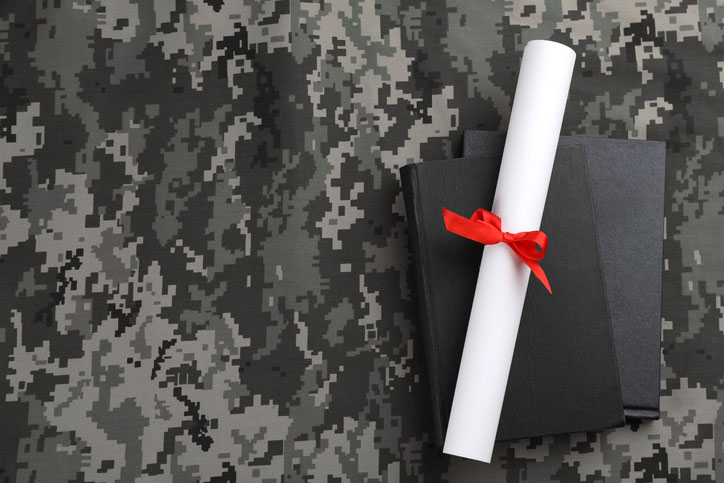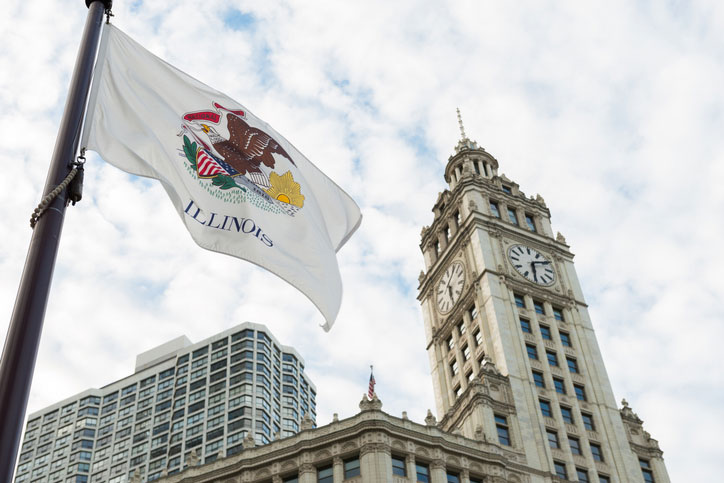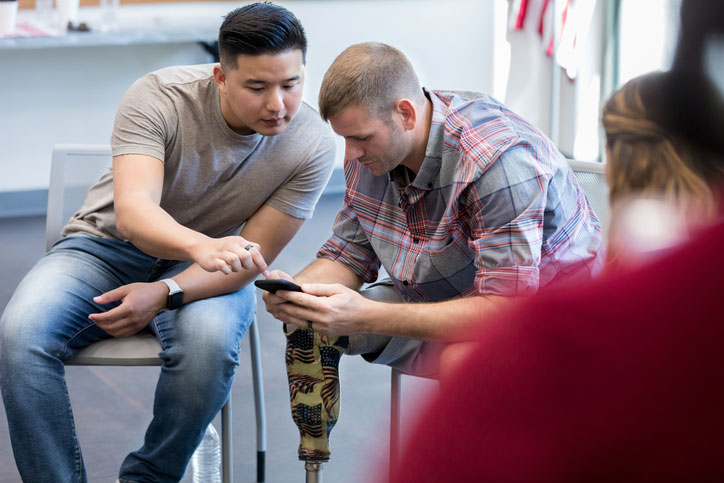Written by Sam Medley

In a lot of ways, veterans make the perfect social worker. They know what it’s like to move away from their support networks and build new ones. They’ve built bonds with people from all walks of life. And throughout their careers, they’ve seen true leadership in action. But just as importantly, they’ve also likely seen the havoc ineffective leadership can cause.
So whether you want to help individuals through the most trying times of their lives or help an entire organization reach more people, the social service workforce needs your talents.
But becoming a social worker in Illinois requires earning a bachelor’s degree in social work (BSW) or a Master’s of Social Work (MSW). As a student veteran, you may face some barriers other students might never consider.
Fortunately, you also have some amazing resources at your disposal. From financial aid to professional guidance, this list contains a wealth of programs that put becoming a social worker squarely in your grasp.


General Resources
No matter what kind of social worker you want to become or which branch of the military you served, there are a few organizations you’ll likely come into contact with as you earn your degree. Some offer guidance and assistance while others enforce social work regulations across the state. After earning your degree, you may even work with or for some of the organizations in this section.
The US Department of Veterans Affairs (VA)
Through the VA, veterans and active duty service members can apply for the many benefits they’re entitled to. This includes healthcare, GI Bills, housing assistance, and specialized home loan programs. On top of that, the VA is one of the nation’s biggest employers of social workers.
Illinois Department of Veterans’ Affairs (IDVA)
The IDVA helps Illinois veterans understand and obtain their federal benefits. Also, many of the financial aid and scholarship opportunities included on this list require paperwork from your time in the military. These records can typically be requested through the IDVA.
Illinois Department of Financial and Professional Regulation (IDFPR)
The IDFPR is the organization responsible for granting social work licenses in Illinois. They also handle renewals, continuing education requirements, and disciplinary hearings.
Council on Social Work Education (CSWE)
To become a Licensed Social Worker or Clinical Licensed Social Worker in Illinois, you need a degree from a school that has been accredited by the CSWE. These schools must adhere to strict guidelines so that they’re students can become passionate and well-informed professionals.
Illinois Student Aid Commission (ISAC)
The ISAC runs many of Illinois’ state-funded financial aid programs including grant and loan repayment and forgiveness programs. In addition to assisting veteran students, they also help MSW grads pay for the training and licensing they need to become school social workers.
The Illinois Department of Human Services (IDHS)
The IDHS isn’t just one of the state’s biggest social worker employers. They can also help veterans navigate the often confusing world of federal benefits. And as a state employer, they extend preferred hiring status to qualifying veterans seeking employment amongst their ranks.
Federal Military Education Benefits
Before looking for scholarship opportunities, it’s important to understand what financial benefits student veterans are entitled to. While this section presents multiple types of education benefits, it’s important to work with government and school representatives to figure out which one is right for you.

Post-9/11 GI Bill (Chapter 33)
Whether you want to earn a bachelor’s or Master’s in Social Work (MSW), the Post-9/11 GI Bill can help you pay for it. It can be used for tuition, housing, mandatory fees, and many other educational expenses. Tuition and school fees are often paid directly to schools.
Many veterans choose the Post-9/11 BI Bill benefits package because of its flexibility. It’s open to veterans who have served at least 90 days on active duty after 9/11 and have been honorably discharged. You can even begin using it while on active duty if you’ve served for 30 continuous days. But the best part is that these benefits don’t expire if you separated after January 1, 2013.
Montgomery GI Bill- Active Duty (MGIB-AD)
While the MGIB-AD can cover many of the same things as the Post-9/11 GI Bill, benefits expire 10 years after separation. Additionally, benefits are typically paid directly to the student on a monthly basis.
There are multiple ways to qualify for the Montgomery Bill, but benefits are calculated based on factors like length of service, the type of training or educational program you enroll in, and whether or not you paid into the Montgomery GI Bill Buy-Up program.
Montgomery GI Selected Reserve (MGIB-SR)
Members of Selected Reserve branches as well as the Air and Army National Guard can qualify for aid for up to 36 months of vocational training or higher education. However, eligibility typically ends when you separate from your branch.
You can qualify for these benefits after completing your initial active duty for training. You must also:
- Have a six-year obligation or be an officer who agrees to an additional six-year obligation.
- Hold a high school diploma, GED, or similar qualification before completing your initial active duty for training.
- Stay in good standing.
Benefits are typically based on two factors: what type of training or education you’re pursuing and how many hours of classes you’re taking.
State-funded Financial Aid Programs for Veterans
In Illinois, federal education benefits are only the beginning. The state government also offers a few programs that make earning a BSW or MSW more budget-friendly. In some cases, combining federal and state benefits could bring educational costs down to zero.

The Illinois Veterans’ Grant pays for all tuition and mandatory fees at Illinois community colleges and public universities. Benefits typically last for four academic years and can be used for undergraduate and graduate studies. If you have GI Bill benefits but don’t qualify for 100%, this grant can cover the gap.
To be eligible, you must either be an Illinois resident, were a resident when you started active duty, were enrolled in a state college within six months of starting active duty, or plan to become an Illinois resident within six months of returning from active duty. Those who served on active federal duty for at least one year or served in a foreign nation during a time of hostility for any length of time can qualify. This program extends to veterans of the Reserves and the Illinois National Guard.
This program is similar to the Illinois Veterans’ Grant in that it covers tuition at Illinois community colleges and public universities. However, the eligibility requirements are a bit different. To qualify, you must be:
- An active member of the Illinois National Guard who has completed one full year. Alternatively, if you were a member of the National Guard and your studies were interrupted by federal active duty, you may still qualify.
- An officer or enlisted member.
- Enrolled in an Illinois public university and maintain the minimum GPA required by your school.
If you’ve served less than 10 years in the Illinois National Guard, you may qualify for up to four years of financial aid. If you’ve served more, you can qualify for up to six years of aid.
While colleges and universities typically have their own work study programs, the Illinois Department of the VA offers additional opportunities to veterans. Positions can be found at VA medical facilities and regional offices as well as some non-VA veteran service organizations. Pay is the greater of the state or federal minimum wage.
Scholarships and Other Forms of Financial Aid for Veterans
If federal and state benefits don’t cover all of your costs, you may want to explore other funding opportunities, as well. This includes scholarships and grants offered by specific schools and nonprofit organizations. However, keep in mind that these resources are typically limited to a certain number of students per year.
If you’re an out-of-state student or earning a degree in social work from a private school, GI Bill benefits and state grants may not cover all of your expenses. Or if you don’t qualify for full GI Bill benefits, you may still have to pay a considerable amount of tuition. Through the Yellow Ribbon Program, you can cover most if not all of those expenses.

The Yellow Ribbon Program is a partnership between the Department of Veterans Affairs and specific schools across the country. Participating schools waive part of veteran students’ expenses. The VA matches their waiver.
According to the VA database, 10 CSWE-accredited colleges in Illinois are in the Yellow Ribbon Program:
- Aurora University.
- Chamberlain University.
- Chicago State University.
- DePaul University.
- Dominican University.
- Lewis University.
- Loyola University.
- Southern Illinois University-Carbondale.
- University of Chicago.
- University of St. Francis.
How much aid veteran students receive varies between schools. Similarly, each school only gives funding to a certain number of students each year. Be sure to check with your school’s admissions or veteran assistance office.
This donation-driven, Illinois-based nonprofit offers scholarships to students whose GI Bills don’t quite meet their needs. Their award recipients are leaders, ambassadors for their organization’s ideals, mentors to others, and demonstrate financial need. While the Patriot Education Fund website doesn’t list a specific scholarship amount, they offer multi-year awards. However, these awards are typically awarded to undergrads and students seeking certificates or vocational training.
Whether you’re a veteran or on active duty, AMVETS has scholarships available to students who served in every branch of the Armed Forces. Their biggest scholarship (worth $12,000) even has Illinois roots. The Dr. Aurelio M. Caccomo Memorial Scholarship is awarded in honor of an Italian immigrant who served in the Army Reserves, made Colonel, and spent his remaining years at the University of Illinois’ Department of Orthopedics. It’s funded through a foundation Dr. Caccomo set up himself.
About 60 Tillman Scholars are chosen from veterans, active duty service members, and their spouses across the country. They’re chosen based on their dedication to service in and out of the military, their passion for lifelong learning, and their ability to lead by example. Scholarships are typically worth about $10,000 and also come with the opportunity to meet other scholars at Foundation events and participate in leadership development.
Branch-based Financial Aid Programs
If you’re on active duty, you don’t necessarily have to wait to earn a degree in social work. Each branch of the Armed Forces extends financial aid to their members. The amount of aid you’re eligible for is subject to change so be sure to speak with a representative in your branch for the most up-to-date information.
The Air Force Military Tuition Assistance (MilTA) Program
Members of the Air Force and Air Force Reserves can apply for up to 100% tuition assistance for an undergraduate or graduate degree. Undergraduates must maintain a 2.0 GPA while graduates must maintain a 3.0. This program covers up to 124 semester hours for undergraduate studies and 42 semester hours for graduate programs.
Army Education Assistance Programs
The Army offers multiple tuition assistance programs for members of the Army, the Reserves, and the National Guard. Their basic tuition assistance program pays up to $4,000 per academic year. The Green to Gold program covers costs for bachelor’s degrees and two-year graduate degrees.
The Coast Guard Tuition Assistance (TA) Program
Active duty service members, Selected Reservists, and some civilian employees can apply for up to $4,500 of yearly tuition assistance. Civilians must complete at least 90 days of employment before applying. Active Duty Officers must agree to serve two years in the Coast Guard upon degree completion while Reserve Officers must agree to serve four.
Marine Corps Educational Assistance Programs
Marines can apply for up to $4,500 a year in tuition assistance for a bachelor’s degree. Those seeking graduate degrees can apply for the Advanced Degree Program and receive partial funding while earning full pay.
Navy Tuition Assistance Program
The Navy Tuition Assistance program is open to all active duty members. This program pays $250 per semester hour for up to 120 hours. Sailors can also receive aid to pursue a professional certificate.
Looking for more ways to fund your calling? Check out our list of scholarships and other financial aid resources for social work students in Illinois.
Support Programs
On the road to becoming a social worker, financial aid only goes so far — especially for veterans transitioning back into civilian life. The organizations in this section specialize in supporting veterans personally, educationally, legally, and more. No matter what obstacles you encounter, there’s someone out there who’s been through it and came out on the other side.

Every Illinois community college and public university has veteran coordinators on staff. These professionals can help students use their military benefits, offer academic counseling, and can connect veterans to programs that help ensure success after separation.
Making Military Training Count
This statewide program allows student veterans to get academic credit for training, courses, exams, and other experiences completed during their time in the military. This means you might be able to graduate quicker and save more money. If you’re on active duty and have to move in the middle of your studies, this program can also help you find classes at nearby schools that you can transfer back to your home school.
Between state, federal, and non-profit organizations, veterans and their families have a lot of resources available no matter what they need. However, finding the right ones can be confusing and frustrating. IJF is dedicated to connecting veterans to services that meet their needs and minimizing the need to shuffle between offices. In partnership with other organizations, IJF helps veterans get housing, employment, mental health, and material assistance.
Based in Chicago, the Road Home project is perhaps one of the most comprehensive veteran mental health organizations in the country. They offer in-person counseling, outpatient services, and a wide range of virtual counseling and peer support programs. These services come at no cost. The Road Home Program bills insurance when possible, but covers copays and other expenses.
The Illinois Office of the Attorney General
Veterans are entitled to certain rights and the benefits they’ve worked so hard to earn. Through the state’s Attorney General’s Office, they can submit requests for rights assistance and lodge complaints against organizations that violate their rights or exploit their benefits.
The Illinois Association of County Veterans Assistance Commissions (IACVAC)
While most veterans access their benefits through the VA, many get lost in the shuffle. Illinois’ 48 Veterans Assistance Commission offices strive to prevent that. They help veterans identify where their needs aren’t being met, review and correct VA ratings, and submit appeals to the VA when needed. Their trained advocates can also help veterans get assistance with other issues through the state’s massive network of veteran assistance organizations.
Veteran Readiness and Employment (VR&E)
The VA’s VR&E program helps veterans transition successfully into the civilian workforce and back into civilian life in general. They connect veterans with on-campus support, provide job-seeking guidance, and can help veterans find careers with organizations that prioritize veterans in their hiring processes.
Author

Sam is a freelance writer with a passion for learning about any and everything he can. When not reading or writing, he can be found helping his wife tend to the bees, ducks, chickens, and plants that populate their little Kentucky homestead.
View all posts






